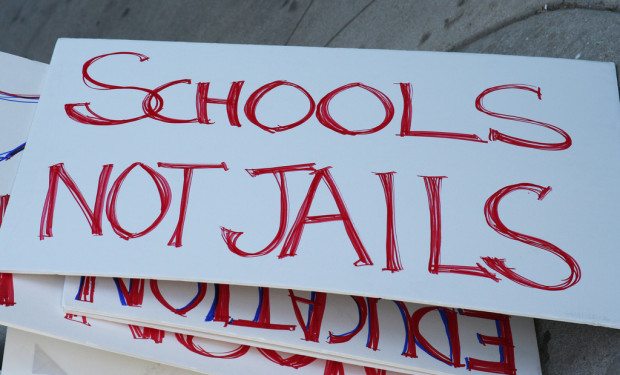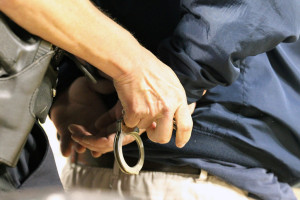Wake County Schools face lawsuit over policing practices and “school-to-prison pipeline”
After experiencing consequences of the school-to-prison pipeline in the Wake County Public School System, students have decided to fight back.
North Carolina is the only state that treats all sixteen and seventeen year-olds as adults when charged with criminal offenses. After they have been charged, these teenagers are not given a chance to return to the juvenile justice system. Wake County schools—along with many schools across the nation—have blurred the line between school discipline and criminal charges, exacerbating an already harsh state law. This has resulted in what has been coined the “school-to-prison pipeline.” Minor student misbehavior has resulted in criminal charges at an alarming rate. This led to the filing of a complaint against the Wake County Public School System (WCPSS) alleging a pattern of discrimination and unlawful criminalization in Wake County schools.
Some students have been punished for things as minor as stealing paper from a recycling bin or horse playing with friends.
The January 22, 2014, complaint (pdf) claims that the Wake County Sheriff’s Department, eight police departments in Wake County, and the Wake County Public School System violated the U.S. Constitution, Titles IV and VI of the Civil Rights Act of 1964, Title II of the Americans with Disabilities Act of 1990 and Section 504 of the Rehabilitation Act of 1973.
To make matters worse, African-Americans and students with disabilities are targeted more than other groups. A shocking 74% of the school-related delinquency complaints concern African-American students, while only 17-23% involve white students. A total of eight students are named as plaintiffs in the complaint, all of whom are African-American and seven of whom have disabilities. These students have been targeted and prosecuted for behavior that, while it may have been mischievous, hardly warranted intervention from the adult criminal justice system. Some students have been punished for things as minor as stealing paper from a recycling bin or horse playing with friends.
In addition to punishments for minor misbehavior, the complaint alleges that unreasonable force has also been used against students. For instance, Travis Williams was trying to get a copy of his class schedule when he was accused of trespassing at Southeast Raleigh High School. Travis says that a resource officer slammed him on the ground, picked him up, and slammed him against a window before arresting him. The complaint points out that this type of reaction to minor offenses, and in this case, no offense at all, is facilitating a sense of distrust and hopelessness. Instead of causing these sentiments, school officials should be fostering an environment that emphasizes accountability, but also teaches students how to improve their behavior, before taking matters to the extreme.
And Travis’s situation is not the only example of the extreme measures taken by resource officers at Wake County schools. The complaint also alleges that students have been handcuffed in front of their peers, pepper sprayed, shocked with Taser guns, tackled to the ground, and pushed into walls, windows, and tables. Verbal harassment and unwarranted searches apparently accompany such unreasonable use of force. Students’ rights are being allegedly violated regarding custodial interrogations and searches.
One example of unreasonable force in the complaint involved a resource officer spraying a student in the face with pepper spray even though he was already detained and being punched in the face by two other students. Another student, who was severely disabled, was allegedly pushed by a resource officer and thrown over a railing while school administrators, two of whom knew of the child’s disability, stood idly by. Another allegation involved a police officer grabbing a student, knocking him down, and pushing his head into a concrete sidewalk at least twice. The student was running from a water balloon fight. No other allegations of unlawful behavior had been made before he was aggressively detained.
“We cannot educate students if we can’t control what goes on in the schools and in the classrooms.”
Former Wake County School Board Chair Ron Margiotta defended Wake County’s actions in a statement to WNCN: “We cannot educate students if we can’t control what goes on in the schools and in the classrooms.” However, it is clear that officials have employed – and continue to employ – extreme measures for mostly minor situations. Instead of sending the students to the principal’s office, they are being sent to court and sentenced with a damaged future.
Although sending children to the courthouse may not be the best remedy, there are problems with other disciplinary methods as well. If the children are not charged, school officials have consistently utilized both in-school and out-of-school suspensions as punishment. Legal Aid’s Advocates for Children’s Services found that, during the 2011-2012 school year, most students who were punished by suspension were African-American as well as impoverished or disabled. Jennifer Story, who joined in authoring the report (pdf) by Legal Aid, said “[T]o teach them not to skip school is to force them not to come to school.”
The report concluded that WCPSS does not currently have an effective approach to preventing repeated misbehavior. Keith Sutton served as chairman of the Wake Board of Education in 2013 and has said that the report didn’t come as a surprise to him. Sutton said, “We have had concerns about this for a while. These are things we are aware of and taking steps to address.” Despite Sutton’s promise to rectify the situation, the report found significant inconsistencies with resource officers’ security policies and procedures. Sutton admitted that the schools could use more alternative programs, such as counselors and psychologists, but that the budget has proven to be an obstacle. However, Sutton also admitted that some alternatives do not cost any money.
Ninety percent of the 763 delinquency complaints during the 2011-2012 school year were misdemeanor offenses. Neither district nor local law enforcement agencies keep a record or publish the number of students who are sent into the adult criminal system for minor school-based incidents. Because a total of young students sent to the adult criminal system is not available, it is hard to imagine the exact amount of harm – both directly and indirectly – that these practices are causing. However, the numbers logically lead to the conclusion that many teenagers have been sent directly into the system, and some never leave. The numbers of school-based complaints are increasing along with the amount of school resource officers. In 2012-2013, forty-two percent of all delinquency complaints were school-based.
These students will suffer from a stigmatized future.
While the number of students that are subjected to the adult criminal system is not available, the foreseeable implications are. These students will suffer from a stigmatized future. They will have a blemished academic record. They will be at a higher risk of dropping out of school. They could suffer from mental health issues and eviction from public houses. Some students may even be threatened with deportation. These students will not be able to find sustainable employment. And taxpayers will pay when these students become repeat offenders and are prosecuted time and time again. All of these are possibilities because community service, counseling, or restorative justice was not considered before sending these children into the adult criminal system.
This is not a problem that is confined to Wake County. It is a nationwide epidemic in schools. For an understanding of how dire the issue of the school-to-prison pipeline is across the nation, consider the following statistics provided by Suspension Stories and PBS:
- 40% of students expelled from U.S. Schools each year are African-American;
- 70% of students involved in “in-school” arrests or referred to law enforcement are African-American or Latino;
- African-American students are three and a half times more likely to be suspended than white students;
- African-American and Latino students are twice as likely not to graduate high school as white students;
- 68% of all males in state and federal prison do not have a high school diploma.
A mother of a child named in the complaint summarized the powerful, long-lasting effects of the school-to-prison pipeline and what her son had been put through:
They took everything from my son – his dignity, his trust in the school system, his trust in law enforcement and his chances of getting the music scholarship to college for which he has worked so hard for. I had to sell my car, miss mortgage payments and almost lose everything to pay the attorney and court fees needed to defend my son from being unfairly criminalized. The WCPSS has invested its resources not in my son’s academic record, but instead in a criminal arrest record that will follow him for the rest of his life.
Restorative Justice is one effective measure in dealing with disciplinary problems.
Wake County Schools are addressing the school-to-prison pipeline problem. Campbell Law’s professor Jon Powell is a part of Raising Achievement and Closing Gaps, a subcommittee dedicated to the school-to-prison pipeline. Professor Powell views restorative justice as one effective measure in dealing with disciplinary problems. Professor Powell oversees the Juvenile Justice Project at Campbell Law School where law students are able to work with students in Wake County Schools. The Juvenile Justice Project is in its eleventh clinical year and works closely with students in Wake County Schools who have been accused of criminal activity or disruptive behavior. The restorative approach is used by the clinic, which brings the criminals and the victims together to address their needs and settle their conflicts outside of the courtroom. Professor Powell expressed that the project has around a 90% success rate in resolving disciplinary manners in a way that is satisfactory to both the students and the school.
U.S. Attorney General Eric Holder commented on the school-to-prison pipeline on March 21, 2014, at J.O. Wilson Elementary School. Holder discussed the 2011-2012 findings of the Civil Rights Data Collection (CRDC) as showing the racial disparities in how school discipline is being administered, with African American students being subjected to suspensions and expulsions at three times the rate of white students. Holder impresses the significance of the CRDC findings by saying that, “every data point represents a life impacted, a future potentially diverted or derailed, and a young man or woman who was placed at increased likelihood of becoming involved with the criminal justice system.” Holder goes on to say that the Justice Department’s Civil Rights Division is working with school districts to ensure compliance with federal civil rights laws. The Comprehensive School Safety Initiative, to be managed by the National Institute of Justice, is planning to spend $75 million in researching school violence and how to address the issues.









